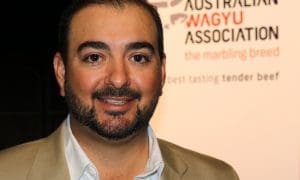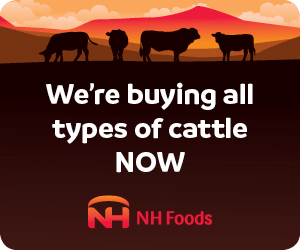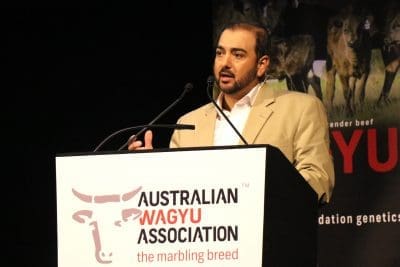TEXAN Red Wagyu producer JoJo Carrales has observed from afar the recent escalations in militant anti-meat activism in Australia, which has included farm and abattoir invasions and city street blockades.
 Visiting Australia to speak at the Wagyu Edge conference in Adelaide earlier this month, he said the US industry is bracing for similar activity in future.
Visiting Australia to speak at the Wagyu Edge conference in Adelaide earlier this month, he said the US industry is bracing for similar activity in future.
“It is coming, we know it is coming,” Mr Carrales told Beef Central.
“We’re probably a few years behind what Australia is seeing in the metropolitan areas, but we know it is coming and want to be on forefront of that as a whole.”
Mr Carrales said the cattle industry needs to ‘take the initiative’ and proactively invest in consumer education to meet the rising challenge of increasing animal activist attacks against the industry.
Mr Carrales is a meat scientist and Vice President of HeartBrand Cattle in Texas, a family-owned, vertically-integrated cattle operation specialising in breeding, feeding, processing and marketing Akaushi (Red Wagyu) cattle in the US (more on the operation below).
“We encourage trips to the ranch, just to show inner city people what we’re doing, we spend time, we spend money.
 “We try to educate people how we raise cattle, not just HeartBrand but almost all cattlemen are very good at animal husbandry and environmental stewardship.”
“We try to educate people how we raise cattle, not just HeartBrand but almost all cattlemen are very good at animal husbandry and environmental stewardship.”
Mr Carrales said HeartBrand proactively shows pictures and videos in restaurants serving its beef to show how cattle produced under the brand are raised.
“It costs us money but I think it is worth showing them why we’re not bad people, we’re raising healthy animal protein, wholesome, safe and delicious beef and that we have nothing to hide.
HeartBrand Beef is headquartered in Harwood, Texas, and is one of the most advanced Wagyu breeding and feeding programs in the world outside Japan.
The operation was established by Al and Maree Woods with cattle from one of the first imports of Wagyu cattle from Japan in 1994.
The operation sells beef under its certified ‘HeartBrand’ retail brand, with all beef sourced from a herd of 14,000 Akaushi full-blood or half-blood cattle, which are raised both on HeartBrand’s own land and on a large network of collaborating commercial ranches.
After buying the operation in 2006 the Beeman family has focused expanding the herd using a crossbreeding and buyback model.
 HeartBrand breeds its own Akaushi bulls and sells about 350 a year to commercial cattle producers bull buyers who typically join the bulls to Charolais, Angus or Hereford cows.
HeartBrand breeds its own Akaushi bulls and sells about 350 a year to commercial cattle producers bull buyers who typically join the bulls to Charolais, Angus or Hereford cows.
Those breeders then have the option to sell their offspring back to HeartBrand as weaned calves, yearlings or finished animals. All cattle sold into the HeartBrand program must be DNA verified as at least half Akaushi.
Mr Carrales said the buyback system had enabled the Beemans to expand the HeartBrand production program while also giving progressive commercial producers an opportunity to fetch a premium price.
Mr Carrales said US cattle producers were very phenotypic driven, focusing on growth, muscle and skeletal width. The red coated, tick resistant Red Wagyu was a good fit, striking a balance between production and marbling. Some US commercial producers were buying Akaushi Red Wagyu bulls specifically for calving ease to produce lighter birthweight offspring, while also allowing them to gain premium on the calves instead of a discount they would previously receive from traditional heifer bull options.
DNA verification of breed is just one of several strong selling points underpinning HeartBrand beef brand. HeartBrand cattle are never implanted with hormones, are fed an all- natural diet and are not given antibiotics or beta agonists in the feeding phase of life.
HeartBrand’s own early investments in research helped to confirm the higher instance of healthy unsaturated fatty acids in Wagyu beef, which is why the “HeartBrand” name was chosen for the business.
Most HeartBrand cattle are finished at Bovina Feeders near Farwell, Texas, then harvested at Caviness Beef Packers in Hereford, Texas. About 250 carcases are currently processed per week, with plans to grow to 300 per week later this year.
The Akaushi F1s are typically reaching 1400 pounds (650kg) liveweight at 18-20 months of age, Mr Carrales said, but feeding periods and turnoff weights can change as required in response to changing input costs and market prices.
On average about 5 percent of young fed cattle in the US grade US Prime, the highest marbling level.
About 35pc of Akaushi F1 offspring under the HeartBrand protocol achieve the premium-priced US prime grade. That percentage is actually higher at 45-50pc this year, due to lower corn prices allowing cattle to be turned off slightly heavier.
Mr Carrales said the HeartBrand program often welcomes city visitors to its ranch (lots of pictures on the HeartBrand website here https://heartbrandcattle.com/) to show “how much we love our cattle how happy our cattle are”.
“We have inner city retail staff come out of ranch tours and they’re just blown away with what we do,” he said.
“These are the people at the counter selling the product and the centre of the plate specialist protein for distributors, they are the ones that are getting your product into those restaurants, so as a whole we need to tell people what we do and why and definitely be at the forefront of educating the customer.”
